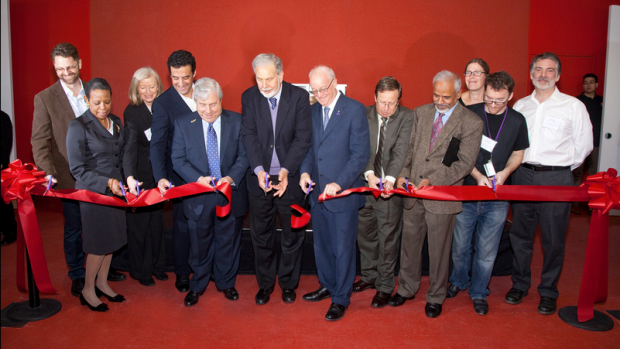MAGNET: Bridging the Gap Between Technology and Culture

The new Media and Games Network (MAGNET) on the campus of the Polytechnic Institute of New York University (NYU-Poly) is a strikingly sleek space—complete with glass walls, and cutting-edge equipment. Among the most arresting features is the extensive but decidedly low-tech collection of classic board games in the Open Library. “You wouldn’t try to write a book before reading one,” Dylan McKenzie, the Program Coordinator of NYU’s Game Center, now located at MAGNET, said. “In the same way, we want our students to be familiar with all types of games before trying to design one. We expect a basic cultural literacy.”
Bridging the gap between technology and culture, MAGNET co-locates NYU’s teaching and research programs in both game design and digital media design; games as a creative art form, computer science, and engineering. It brings under one roof faculty and students from NYU-Poly; the Steinhardt School of Culture, Education, and Human Development; the Tisch School of the Arts; and the Courant Institute of Mathematical Sciences.
Representatives from all the schools were present on October 8, to cut the ribbon and open the facility to the community. Addressing the gathering, NYU Provost David McLaughlin asserted that MAGNET was setting new standards for interschool collaboration and said, “What a great acronym — and a great metaphor, since we are literally drawing together faculty and students from different departments and even different boroughs.”
The crowd -- which included Borough President Marty Markowitz, Council Member Steve Levin, State Senator Martin Golden, Brooklyn Chamber of Commerce Chair Denise Arbesu, and Downtown Brooklyn Partnership President Tucker Reed, among other dignitaries -- was given a chance to tour MAGNET’s state-of-the-art classrooms, labs, black-box theater, and recording studio.
Markowitz commented that it was evident that we had “come a long way from Pong and Atari, let alone [the traditional childhood games] Skully and Jacks.” Citing a recent industry forecast that the global market for video games is expected to grow from $67 billion in 2012 to $82 billion in 2017, he said, “Gaming is set to be bigger than either the music or film business. It represents a lot of tax revenue!”
NYU President John Sexton enthusiastically stressed the significance of MAGNET’s opening, proclaiming, “There are times when you realize that you’re looking at the future, and this is one of them.”
His statement was a comment on not only the innovative work being done by MAGNET’s students and faculty but on what the facility means for Brooklyn as an epicenter of hot new technology and NYU’s latest home. “NYU is doing great things in this borough,” he explained, “from our merger with Poly, which brings engineering back to NYU for the first time in decades, the establishment of the Center for Urban Science and Progress (CUSP), and, of course, MAGNET.” Alluding to Downtown Brooklyn’s Tech Triangle, he continued, “I am so proud that NYU’s growth in Brooklyn is happening at the same time as the borough’s ascendance as a technological capital of the world.”




